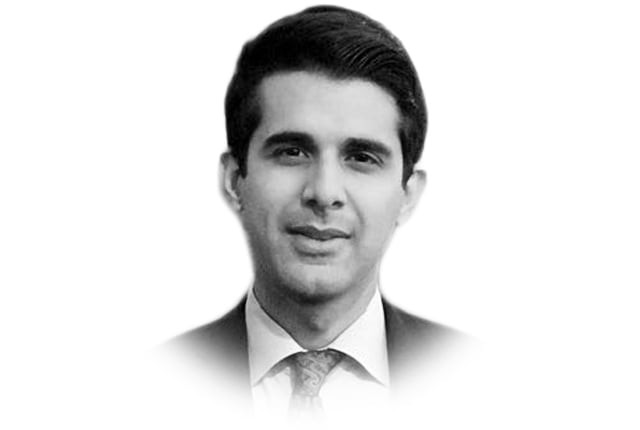The populist revolt
When prosperity is discernable, not necessarily attainable, can it be promised

The writer is a lawyer and can be reached on Twitter @shahzaibkhan901
The common and normal is the subject of disdain, as man strives for something beyond the truth of their existence. Just like a promise of unprecedented prosperity. But in this promise, it’s not the prosperity that captures the imagination of the people, it’s the unprecedented-ness that excites. Prosperity, as with all things, is always considered as a relative and not an absolute. For prosperity to exist, there has to be poverty. Like white on black or vice-versa, one has to exist for the other to become discernable. Only when it is discernable, not necessarily attainable, can it be promised. This is populist politics.
The trick is the unattainability.
As long as there is something in the distance, perceptible, there is a promise. To make prosperity perceptible, populist politics has to rely on the existence of poverty, simply to highlight the possibility of travelling to prosperity. Poverty does not have to be strictly of economics, but can be the poverty of dignity, or even of dominance for nations.
But what if such poverty does not exist?
Even in prosperity, man’s need to believe in something better does not change. It is perhaps the single most important evolutionary trait that sets man apart from other animals, a consistent hope for positive change. And so, a new, improved, zero-calorie, biodegradable prosperity is always on the horizon, always within reach, yet ungraspable. Donald Trump promised prosperity to an America already prospering courtesy of President Obama. To do that, Trump had to play to America’s most American fantasy, a unipolar American superpower-based global order. This in a time when the world has evidently and irreversibly become multi-polar — with China, Europe and Russia on the rise. The possibility of a unipolar world does not exist, but Trump made this possibility discernable to the American people. He painted a most unlikely picture of American dominance. With its economy on track, and welfare for America’s poor on the way, Trump called in America’s poverty of dignity and dominance and promised juxtaposed prosperity. Obama’s universal healthcare, however necessary, seemed mundane to America as Trump promised towering walls on America’s borders, reminiscent of long-past imperial glories. Trump identified enemies in immigrants, Nato and China and vowed to take them on. And America rallied behind him, leaving behind the prosperity of receding conflict, welfarism and economic stability for the new and improved prosperity of global hegemony. It’s the unattainability of this hegemonic cause that brought Trump to the White House and it is what fuels his tenure every day. The day this cause is attained, Trump’s fantasy of hegemonic prosperity will become the new norm, a truth taken for granted, in relation to which an even greater prosperity will become possible. The light at the end of the tunnel keeps us going, if we reach it, the journey ends.
Today, liberal democracy is threatened all over the world by populist politics. The threat is now such that from Brazil to India, the United States to Hungary, populism threatens to upend democratic orders that have been unable to excite the electorate for generations. To the clothed and fed, promises of keeping the clothes and food do not excite. There has to be something more, something unattainable.
The problem is the unattainability.
Before the BJP swept to power in India, the country was already experiencing unprecedented economic prosperity. The poor and hungry of India suddenly found themselves well-fed and sheltered courtesy of the visionary policies of Congress Prime Minister Dr Manmohan Singh, who catalysed India’s economic prosperity as a minister for finance. So, when Modi sought to win power, he sold India a fantasy of hegemonic dominance, playing to the gallery of Hindu fundamentalism. Now, years later, as the unattainability of this fantastical dominance becomes evident, India wants to be fed and sheltered again. Modi now enters an election year, at his weakest, having lost several state elections. India is revolting as the unattainability of Modi’s promises is laid bare.
In his 1943 paper “A theory of human motivation”, Abraham Maslow detailed a psychological theory of a man’s needs. He illustrated the needs in the form of a pyramid where the base consisted of physiological needs, after which the pyramid grew to include safety needs, social belonging and ultimately at the top of the pyramid, self-actualisation. Physiological needs were needs such as clothing, shelter and food and self-actualisation consisted of mate-acquisition, utilising talents and seeking happiness, with everything else in between. He argued that as man reached a particular stage of the pyramid, he would not be able to achieve psychological contentment unless he achieved the next stage.
To a great extent, the traditional political orders of liberal and socialist democracy helped their subjects achieve the psychological benchmarks set by Maslow, even perhaps self-actualisation. Yet, in 1971, Maslow returned to criticise his own theory, evidently having failed to reach contentment despite having achieved self-actualisation. When he returned, he came up with a final stage of his pyramid even beyond self-actualisation. He called it transcendence, where “man would become an end rather than a mean to the cosmos”. This was the moon. This is what contemporary populism is based on. Transcendence beyond self-actualisation. Perhaps this is the reason populist politics will fail, as no political order can sustain the unattainable promise of the moon.
Published in The Express Tribune, December 21st, 2018.
Like Opinion & Editorial on Facebook, follow @ETOpEd on Twitter to receive all updates on all our daily pieces.















COMMENTS
Comments are moderated and generally will be posted if they are on-topic and not abusive.
For more information, please see our Comments FAQ